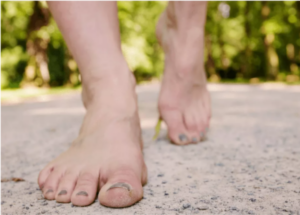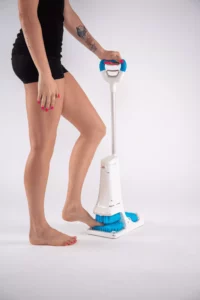Foot care is an essential part of personal hygiene and overall well-being. One common tool used to ensure our feet are clean, smooth, and free from hardened skin is the foot scrubber. However, the question often arises – can using a foot scrubber result in overly sensitive feet? This article will delve into this query, exploring the various aspects and considerations of using a foot scrubber and its potential impact on foot sensitivity.
Firstly, we will gain an understanding of the function of a foot scrubber, exploring how it works and why it’s a popular tool for foot care. We will then discuss the possible side effects of overusing a foot scrubber, as like any other tool, improper or excessive use can lead to unintended consequences.
A significant part of our discussion will focus on the relationship between foot scrubbing and skin sensitivity. We will explore the factors that contribute to increased foot sensitivity, including how the process of scrubbing impacts the skin’s surface.
Recognizing the potential for increased sensitivity, it’s vital to know how to protect our feet while using a scrubber. Hence, we will provide guidance on protective measures that can be taken during foot scrubbing.
Finally, we will delve into the different types of foot scrubbers available in the market and how each can impact foot sensitivity. By understanding the varying designs and materials, users can make informed choices on the best type of foot scrubber to suit their individual needs.
Throughout this article, we aim to provide comprehensive information on the topic, ultimately supporting readers in making informed decisions about their foot care routines.
Understanding the Function of a Foot Scrubber
A foot scrubber is a popular tool used in foot care to help remove dead skin cells, smooth out rough patches, and improve the overall appearance of the feet. It works by applying a certain level of abrasion to the skin, which aids in exfoliating the outer layers of dead skin.
The main function of a foot scrubber is to provide exfoliation for the hard and thick skin that often forms on the soles and heels of the feet. This skin can become hardened due to various factors such as pressure from walking or standing, friction from shoes, and even certain health conditions like diabetes or fungal infections. By gently scrubbing away this dead skin, a foot scrubber helps to reveal the softer and healthier skin underneath.
However, while foot scrubbers can be beneficial, it’s important to understand that they should be used correctly and in moderation. Overuse of a foot scrubber can indeed lead to oversensitivity, as it can thin the skin too much. This could make the skin more prone to injuries or infections, and it could also cause discomfort or pain.
Therefore, understanding the function of a foot scrubber and using it properly is crucial for maintaining healthy and comfortable feet. It’s always recommended to follow the instructions provided by the manufacturer or seek advice from a healthcare professional if you’re unsure about how to use a foot scrubber.
Possible Side Effects of Overusing a Foot Scrubber
Overusing a foot scrubber can indeed cause a range of side effects, with increased sensitivity being one of the most common issues. A foot scrubber is designed to remove the dead skin cells that accumulate on the surface of our feet, revealing the softer and more sensitive skin underneath. When used appropriately, this can lead to healthier and smoother feet. However, if a foot scrubber is used too frequently or too aggressively, it can strip away too much skin, leading to discomfort and increased sensitivity.
The skin on our feet is naturally thicker than the skin on other parts of our bodies. This is due to the constant pressure and friction that our feet experience from walking, running, and other forms of movement. When the protective layer of skin on our feet is removed excessively, the underlying layer of skin can become exposed and vulnerable. This can lead to symptoms such as pain, tenderness, redness, and increased sensitivity to pressure and temperature.
In addition, overusing a foot scrubber can also disrupt the skin’s natural moisture balance. This can lead to dryness and cracking, which can further increase sensitivity and potentially lead to other complications such as infections. Therefore, while a foot scrubber can be a useful tool for maintaining foot health, it is important to use it responsibly and be aware of the potential side effects of overuse.
The Relationship Between Foot Scrubbing and Skin Sensitivity
Foot scrubbing is a common practice aimed at removing dead skin cells and promoting healthier skin. The process is especially useful for the feet, which often accumulate a lot of dead skin due to the constant pressure and friction they are subjected to. However, the relationship between foot scrubbing and skin sensitivity is a rather complex one.
Skin sensitivity refers to how reactive your skin is to certain stimuli. Some people naturally have more sensitive skin than others. This sensitivity can be exacerbated by certain practices, including excessive foot scrubbing. Regular and vigorous scrubbing can strip the skin of its natural oils, leaving it dry, cracked, and more sensitive to external stimuli.
The skin on our feet is naturally thicker than the skin on other parts of our body. This is to protect them from the wear and tear they are subjected to daily. However, when we scrub our feet excessively, we risk removing this protective layer. Once this layer is removed, the skin underneath, which is more sensitive, is exposed. This can result in increased sensitivity, which can be uncomfortable and even painful.
The level of sensitivity can vary depending on the individual and the tools used for scrubbing. Some foot scrubbers are more abrasive than others, leading to increased sensitivity. Additionally, the frequency and intensity of scrubbing can also play a part in determining the level of sensitivity.
In conclusion, while foot scrubbing can contribute to healthy, soft feet, overdoing it can lead to increased skin sensitivity. It is essential to strike a balance and understand your skin’s individual needs to avoid discomfort and potential damage.
Protective Measures While Using a Foot Scrubber
Using a foot scrubber can indeed make your feet more sensitive if not used properly. This is where the importance of protective measures while using a foot scrubber comes into play. These measures ensure that you get the benefits of exfoliating your feet without the downside of increased sensitivity.
Firstly, it’s crucial to not overuse the foot scrubber. Over-scrubbing or scrubbing too hard can cause the skin to become raw and sensitive. Instead, gentle and regular use is more beneficial. This can help remove dead skin cells, improve circulation, and promote healthier skin without causing unnecessary damage.
Secondly, choosing the right type of foot scrubber is essential. Different foot scrubbers have various effects on the skin. Some are more abrasive, while others are gentle. If your skin is already sensitive or prone to damage, choosing a gentle scrubber is recommended.
Lastly, it is important to moisturize after scrubbing. This helps to nourish the skin and restore its natural barrier, reducing the chances of sensitivity. Using a foot cream or lotion with ingredients like shea butter or aloe vera can soothe and hydrate the skin, protecting it from becoming too sensitive.
In conclusion, while a foot scrubber can cause feet to become too sensitive, this can be mitigated by taking protective measures such as using the scrubber gently and appropriately, choosing the right type of scrubber, and moisturizing after use.
Types of Foot Scrubbers and Their Impact on Foot Sensitivity
The different types of foot scrubbers have varying impacts on foot sensitivity, which is a crucial aspect to consider when discussing the question: Can a foot scrubber cause feet to become too sensitive?
Foot scrubbers come in several forms, such as pumice stones, metal files, electronic callus removers, and brush scrubbers. Each type has its unique characteristics and effects on the feet.
Pumice stones, for instance, are natural volcanic rocks used to gently exfoliate and smooth the skin. If used properly, they can effectively remove dead skin without causing increased foot sensitivity. However, excessive or vigorous use can lead to skin thinning, which may heighten sensitivity.
Metal files are typically more abrasive and are used for tougher or thicker calluses. Their aggressive nature can easily lead to overuse, causing the skin to become thinner, more sensitive, and prone to pain or discomfort.
Electronic callus removers and brush scrubbers offer more control and are generally less harsh on the feet. These devices often feature varying levels of scrubbing intensity, allowing you to adjust based on your comfort and needs. Nonetheless, overuse or misuse of these devices can still cause increased foot sensitivity.
In conclusion, while foot scrubbers can be beneficial in maintaining foot health and hygiene, their impact on foot sensitivity largely depends on the type of scrubber and how it’s used. Regular use in moderation, along with proper foot care, can help prevent the feet from becoming overly sensitive.




